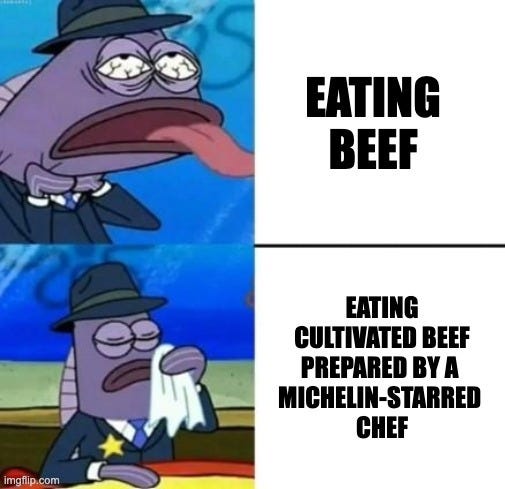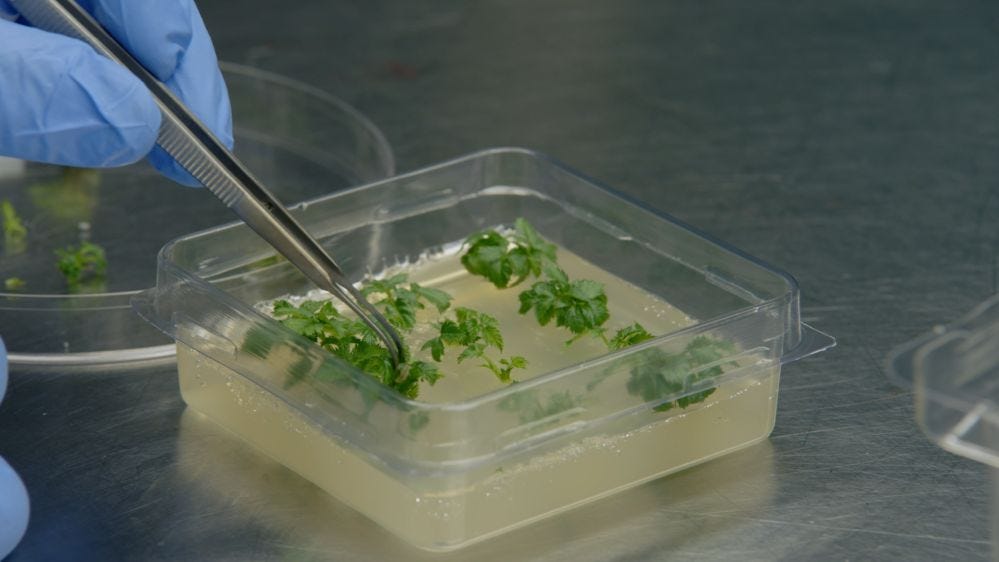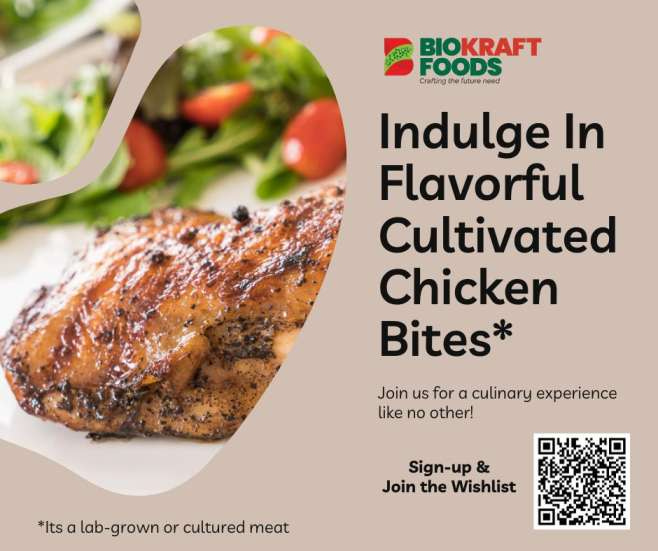$40M for CRISPR Crops, New Zealand Backs Cultivated Fish, and Vitamin-Rich Super Golden Lettuce
Also: China and UK updated food safety guidelines to favor novel foods
Hey, welcome to issue #75 of the Better Bioeconomy newsletter. Thanks for being here!
Here’s my favourite quote that I came across while working on this week’s issue:
“Aleph Farms has given me the opportunity to bequeath a future that avoids causing suffering to billions of animals, in which people will be one with nature and not harm it, in which Aleph Cuts are more wonderful than the meat we know today and is so without killing a single animal, and in which our happiness does not require that the animals with which we share the world feel pain”
- Eyal Shani, Michelin-starred chef
BTW: If you are an agrifood startup founder (or thinking of being one) working on solutions for sustainable food systems, I'd love to connect—feel free to reach out! 🙂
Let’s dig into the latest developments in biotech, shaping the future of food and agriculture! 🍽
BIO BUZZ
🇮🇱 Aleph Farms is preparing to launch its cultivated beef steaks in restaurants, partnering with Michelin-starred chef Eyal Shani
Last year, Aleph Farms became the third company worldwide to secure regulatory approval for cultivated meat. As both an investor and launch partner, Shani will help introduce the product through a series of dining experiences.
Eyal Shani’s global culinary influence is a major asset to Aleph Farms. Renowned for his focus on high-quality ingredients, Shani could enhance the brand's cultivated beef offerings through his restaurant empire, which includes 17 locations in Tel Aviv and around 50 worldwide.
The Petit Steak, a hybrid of cultivated Black Angus beef cells and plant-based proteins (soy and wheat), is designed to offer a high-quality beef experience. It will be priced competitively with premium beef.
Source: Green Queen
🇰🇷 Scientists used a magnetic nanoparticle DNA delivery method for cucumbers, improving genetic modification efficiency
Genetic modification in crops like cucumber is tough mainly due to complex tissue culture requirements making traditional gene transformation techniques, like Agrobacterium-based methods, less effective.
Magnetofection, a cool DNA delivery method could be the key to overcoming these challenges. This technique uses magnetic nanoparticles to deliver DNA, offering a more effective and streamlined alternative to older methods.
By using magnetic nanoparticles as DNA carriers, researchers at Pusan National University successfully inserted DNA into cucumber pollen. This modified pollen was then applied to female cucumber flowers, resulting in seeds that showed strong gene expression in key areas like roots and cotyledons.
Source: Phys.org
🇪🇸 Researchers developed super golden lettuce increasing beta-carotene levels by 30x without disrupting photosynthesis
Beta-carotene, a key carotenoid found in plants, plays a key role in our health. It’s the main precursor to vitamin A, which supports healthy vision, a strong immune system, and cell growth. It also has antioxidant and cognitive-boosting properties.
In the study, tobacco and lettuce plants were tested in the lab, and scientists were able to raise beta-carotene levels without messing with the plants' vital processes like photosynthesis by storing them in new parts of the plant cells.
The Spanish National Research Council team found that storing beta-carotene in fat-storage vesicles within chloroplasts, away from photosynthetic complexes, increased its accumulation and improved bioaccessibility for the human body.
Source: Phys.org
🇨🇳 Breakthrough in Neopyropia gene editing boosts prospects for reverse genetics in economic macroalgae
Neopyropia is an important macroalga, especially in China, Japan, and South Korea, where it's a top choice for cultivation. It also serves as a potential model organism for studying the evolution of photosynthesis in red algae.
However, working with Neopyropia’s genes is difficult. Its genome is complex, with an unusually high GC content and unclear mechanisms controlling gene expression. These factors have made it difficult for scientists to crack the code of genetic breeding and reverse genetics.
A research team at the Chinese Academy of Sciences successfully edited the Neopyropia yezoensis genome using CRISPR/Cas technology, opening new avenues for molecular breeding and advancing research on this economically important macroalga.
Source: Phys.org
MACRO STUFF
🥛 Alt proteins could be the solution to the dairy industry’s problems, according to a new report by Eatable Adventures
Despite being a $944B market, the dairy industry is battling labour shortages, rising costs (8.2% between March 2023-24), and environmental concerns, contributing 4% of global emissions.
Alt dairy solutions (plant-based, fermentation, cellular ag, and molecular farming) offer hope, though they also face issues like capacity bottlenecks, high costs, and regulatory roadblocks. Collaboration between startups and big dairy companies is the way forward.
Emerging technologies like AI, precision fermentation, and hybrid products are key to reducing costs, emissions, and enhancing nutrition. Upcycling waste like soy and oats into dairy adds sustainability and economic value.
Source: Green Queen
🇬🇧 The UK’s Food Standards Agency plan changes to accelerate and modernize the approval process for novel foods
These changes could cut months off the process by getting rid of outdated steps. The reforms have strong backing from the food industry, with major players like Mosa Meat and Meatable showing support, along with 70%+ of stakeholders agreeing with the proposals.
Instead of a slow parliamentary process, a new public register will help fast-track new food products to market, speeding up market authorisations for products like cultivated meat and precision-fermented foods.
The FSA plans to eliminate the need for renewals on feed additives and GMO-based foods every 10 years, lightening the agency’s caseload, especially with 300 renewals looming in the next couple of years.
Source: Green Queen
🇨🇳 China’s new food safety guidelines cover “three novel foods” types, including new raw materials, additives, and food-related products
Genetically modified microorganisms (GMMs) used in food processing will now undergo direct safety evaluations, streamlining the approval process under CFSA's supervision.
China is building on its progress in novel food ingredients, particularly human milk oligosaccharides (2'-FL and LNnT), for use in infant formulas.
The new guidelines aim to shorten review cycles, speeding up the commercialization of synthetic biology in food and increasing the availability of food options.
Source: Bits x Bites
📖 New "Ag Playbook" by Leaps by Bayer and other industry leaders, offers a baseline framework for product development in ag tech
Its goal is to streamline product development in the agriculture sector by creating a common language and clear guidelines for startups, investors, and industry leaders on how to move forward.
One big hurdle for ag tech startups is scaling. The playbook highlights the high costs of deploying solutions across millions of acres and the critical need for partnerships with established agricultural players. Bypassing these partnerships and going straight to farmers can be an expensive error.
The playbook focuses heavily on crop protection products, especially small molecules. It notes that development costs have nearly doubled over the past 15 years, and it now takes up to 12 years to bring a product to market. This is largely due to more rigorous testing and lengthy regulatory approval processes.
Source: AgFunder
BIO BUCKS
🇺🇸 Pairwise raised $40M Series C and entered a 5-year JV with Corteva to advance gene editing in corn and soy for climate resilience
This round brings Pairwise’s total equity funding to $155M. With the fresh funding, they are looking to accelerate product development by scaling the 'Fulcrum' gene-editing suite, which allows precise modifications in plant genetics.
Thanks to partnerships with big agritech players like Bayer and Corteva, Pairwise now has access to “hundreds of millions of acres” of farmland to use their technology.
The JV will focus on using CRISPR technology to improve crop traits like drought tolerance and pest resistance. By working with a vast germplasm library, breeders can now precisely target beneficial traits in plants, overcoming the inefficiencies of traditional breeding methods.
Key investors: Deerfield Management, Aliment Capital, Leaps by Bayer, and Corteva
Source: AgFunder
🇳🇿 New Zealand government invested NZ$9.6M over 5 years to develop cultivated fish products
Plant & Food Research, a state-owned agency, will work on developing new ways to grow fish cells that could “fundamentally change the way” the cells are used by advancing cell line development and media formulation.
The program will also consider the social and cultural landscape of New Zealand, focusing on Māori perspectives and how cultivated fish products align with their culture, particularly regarding culturally significant taonga species.
Led by Dr. Georgina Dowd, the research aims to improve the viability, health, and scalability of fish cell cultures, with the goal of developing natural nutrient sources for cultivated fish and cell-based collagen.
Source: Green Queen
🇺🇸 Ecovative raised $28M to expand its mycelium-based products, including MyBacon and sustainable leather brand
This funding round brings the New York-based company’s total funding to $145M since 2019, with a mix of strategic investors and existing shareholders backing this round.
Ecovative is planning to expand its MyBacon product from being in 600 stores to “thousands” by 2025. The company is also introducing a new sustainable alt leather line for jackets and accessories under its Forager brand.
MyForest Foods, Ecovative’s alt meat brand, is crushing it in the northeast. Spins data shows that MyBacon is outselling its competitors by three times, showing up in major retailers like Whole Foods and Berkeley Bowl.
Source: Green Queen
🇺🇸 Arzeda raised $38M in an oversubscribed round to advance protein design commercialization efforts
This capital will be used to expand production of their ProSweet Enzymes™ and ProSweet RebM™. These products are designed to improve the taste of stevia—and accelerate the commercialization of other products.
Arzeda’s Intelligent Protein Design Technology™ combines advanced generative AI and one of the largest proprietary datasets of protein designs to create high-performing proteins and enzymes tailored for large-scale industrial production.
The company is working with industry heavyweights like Unilever, and AAK to bring its protein-based innovations to the market to position itself as a major player in various industries including food and agriculture.
Key investors: Sofinnova Partners, Fall Line Capital, Sucden Ventures, and more
Source: Business Wire
🏴 MiAlgae raised £14M in Series A to build a commercial-scale facility to produce omega-3 fatty acids using microalgae fermentation
This facility in Scotland will significantly ramp up its production from a demo-scale site that currently produces "a few tons a week" to thousands of tons annually.
Their microalgae are grown in fermentation tanks through a heterotrophic process, meaning it doesn't rely on light but rather use leftover liquid from whisky production, which is packed with sugars and nutrients.
MiAlgae’s main focus is on providing sustainable omega-3s to the aquafeed and pet food markets, helping industries like salmon farming reduce their reliance on fish oils, which are depleting fish stocks globally.
Key investors: SWEN Blue Ocean, Clay Capital, Rabo Ventures, and more
Source: AgFunder
🇫🇷 Standing Ovation raised €3.75M in Series A+, adding to the €12M raised earlier to scale up production of precision-fermented casein
The cash injection will help the French startup ramp up production of its patented Advanced Casein product, with plans for a US market launch by 2025.
Yvan Chardonnens steps in as the new CEO, taking over from co-founder Romain Chayot. Chardonnens brings extensive experience from global companies like Unilever and Firmenich as the company scales its operations.
The startup produces bioidentical casein that matches the amino acid profile and functionality of dairy casein. This animal-free casein is designed to replicate the qualities of dairy in products like cheese, yoghurt, ice cream, and protein bars.
Key investors (Series A round): Astanor Ventures, Peakbridge, Big Idea Ventures, and more
Source: Green Queen
PODS & POSTS
🇮🇳 Biokraft Foods invites consumers to try cultivated chicken for the ‘first time’ in India
Source: Kamalnayan Tibrewal
🎧 Mihir Pershad, founder and CEO of Umami Bioworks, on the importance of aligning incentives with big food companies
APAC AGRI-FOOD INNOVATION SUMMIT
🤝 Meet 1000+ global leaders who are accelerating climate-adaptation strategies for food security in Asia
Better Bioeconomy is excited to be a media partner for the Asia-Pacific Agri-Food Innovation Summit, taking place at Marina Bay Sands on November 19-21!
As the anchor event of Singapore International Agri-Food Week (SIAW), in collaboration with Temasek, the Singapore Food Agency (SFA), and Enterprise Singapore (ESG), the Asia-Pacific Agri-Food Innovation Summit will bring together over 1000 global leaders to identify the strategic priorities as we build greater capacity, security, and resilience in Asia’s agri-food system.
👀 Use my discount code ‘BIO10’ to save 10% – the offer ends on October 3rd!
See you there! 👋🏾
BETTER BIOECONOMY EXCLUSIVE
💬 My conversations with bioeconomy innovators
Innovation Specialist at The Good Food Institute India, Devika Suresh: Laying the Foundation for Smart Protein Leadership in India
Biotech consultant and ex-CSO of Vow, James Ryall: Bridging Science and Business to Support Startups Using Biomanufacturing
Co-founder of Synonym, Joshua Lachter: Financing and Developing Infrastructure for the Bioeconomy
Founder of Bioshyft, Gerrit Feuerriegel: Connecting Innovators, Investors, and Incumbents to Drive the Bioeconomy
CMO of Terra Bioindustries, Rebecca Palmer: Turning Agrifood Byproducts Into Nutrient-Rich B2B Ingredients
That’s a wrap. Thank you for taking the time to read this issue!
Again, if you are an agrifood startup founder working on solutions for sustainable food systems, I’m happy to chat! 👋🏾
Are you new here?
Know anyone else who would dig this newsletter?







Wow very cool issue! So much positive news and developments in the alt protein space that I would NEVER know about if it was not for your outstanding newsletters. In this week's issue I especially liked reading about in Scotland a company is working on creating Omega-3 from the remnants of whisky production. Ha! Now that's thinking outside the box! The community appreciates all your hard work and efforts to help educate us. A+